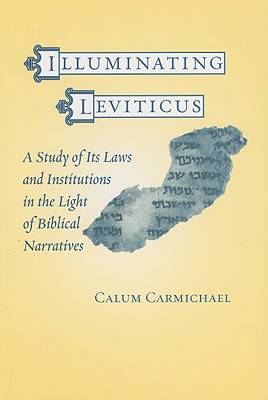
- Retrait gratuit dans votre magasin Club
- 7.000.000 titres dans notre catalogue
- Payer en toute sécurité
- Toujours un magasin près de chez vous
- Retrait gratuit dans votre magasin Club
- 7.000.000 titres dans notre catalogue
- Payer en toute sécurité
- Toujours un magasin près de chez vous
Illuminating Leviticus
A Study of Its Laws and Institutions in the Light of Biblical Narratives
Calum CarmichaelDescription
The origin of law in the Hebrew Bible has long been the subject of scholarly debate. Until recently, the historico-critical methodologies of the academy have yielded unsatisfactory conclusions concerning the source of these laws which are woven through biblical narratives. In this original and provocative study, Calum Carmichael--a leading scholar of biblical law and rhetoric--suggests that Hebrew law was inspired by the study of the narratives in Genesis through 2 Kings.
Discussing particular laws found in the book of Leviticus--addressing issues such as the Day of Atonement, consumption of meat that still has blood, the Jubilee year, sexual and bodily contamination, and the treatment of slaves--Carmichael links each to a narrative. He contends that biblical laws did not emerge from social imperatives in ancient Israel, but instead from the careful, retrospective study of the nation's history and identity.
Spécifications
Parties prenantes
- Auteur(s) :
- Editeur:
Contenu
- Nombre de pages :
- 224
- Langue:
- Anglais
Caractéristiques
- EAN:
- 9780801885006
- Date de parution :
- 01-11-06
- Format:
- Livre relié
- Format numérique:
- Genaaid
- Dimensions :
- 161 mm x 235 mm
- Poids :
- 444 g







